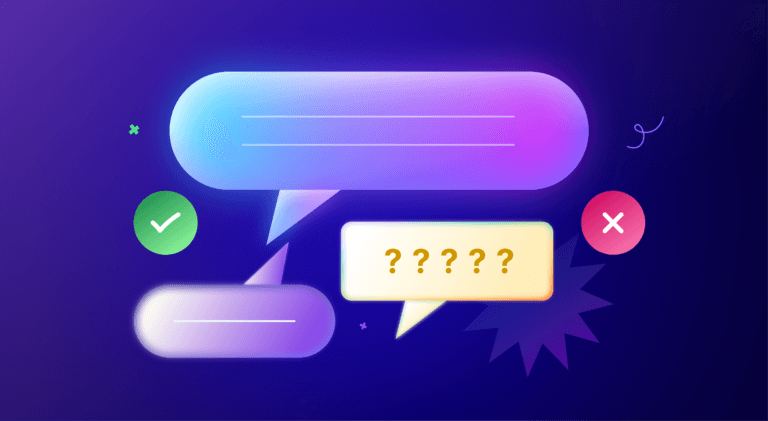
Today, with most customers constantly on the go, brands are busy targeting them with SMS marketing, which is currently an integral part of multi-channel marketing. Still, for some reason, many digital marketing companies are yet to include SMS marketing services in their portfolio.
The loss is to their clients, who miss out on an easy and affordable way to communicate with their customers for better conversions and an increased ROI.
Most organizations are ill-informed about the economies of mobile marketing and believe that it is prohibitively expensive. They are misguided to think that you need to invest in apps and cannot make personalized communications to a targeted audience to improve your ROI.
However, the matter of fact is that SMS is one of the easiest and fastest modes of communication that assists you in reaching a specific audience instantly. Additionally, it is cost-effective, making your brand-building exercise a piece of cake. According to data on 99 Firms, 91% of consumers would opt-in for text messages from brands.
What is Meant by SMS Marketing?
SMS marketing is the strategy adopted by businesses to send text messages to customers highlighting campaigns, product launches, promotions, offers, discounts, updates, and much more. Short Message Service, SMS for short, is a form of communication that brands use to communicate and interact with their customers. An SMS allows brands to reach their customers at a very personal level.
Similar to email marketing, and SMS marketing strategy allows you to have absolute control over who your message recipients are, the type of content you share, and precisely at what time you want them to receive the message. In short, you have complete ownership over your customers’ experience throughout.

Today, companies deploying an SMS marketing strategy also use MMS, or Multimedia Messaging Services, which are text messages with images or GIFs embedded to make them more engaging.

Two Types of SMS Marketing
While implementing SMS messaging as part of your SMS marketing strategy, you must remember that you can send two types of communication to your target audience: the transactional type and the second is the promotional type.
1. Transactional type of SMS marketing
The transactional type of SMS marketing allows organizations to send important information such as payment confirmation, shipping details, etc. Customers are also sent delivery updates for the recent orders they place. Such information keeps the customers happy as they know that the organization is making efforts to keep them informed and updated.
2. Promotional type of SMS marketing
SMS marketing companies generally use promotional messages to increase sales, promote new products, or build brand awareness among consumers. You can send text messages informing your customers about an upcoming online sale or promotion or any new announcements from your company. Some companies send quick, helpful tips on using their products or a link to a step-by-step guide to assembling and using the product after unboxing it.
What are the Uses of SMS Marketing?
Facilitating customer satisfaction is one of the best uses an organization can derive from SMS marketing. You can send your customers personalized messages, which have a better chance of being opened and read than an email. According to Forbes, 59% of customers believe that texting is the fastest way to get in touch with them. And over 64% of the customers think that organizations would benefit from using the SMS strategy to communicate with their customers.

SMSes enjoy higher open, and response rates than emails, and thus, they are very useful in increasing conversions. SMS enjoys the highest click rate compared to any other type of communication. Garner reports that texts enjoy an open rate of 98%, compared to 20% for emails. Also, SMSs have a 45% open rate, compared to a 6% open rate with emails. It is easy to communicate with your customers via SMS and keep them posted on the status of their purchases.
The personalized communication that SMS messages provide helps improve customer satisfaction. According to Statista, 90% of customers agreed that SMS messages from companies were relevant and not annoying. It is easy to use an SMS platform to deliver data-driven messages and understand the customers’ behavior, interests, and purchase history with your company.
No internet access (on either side) is required to send SMS messages. All your customers need is a mobile device to receive SMS text messages. According to Deloitte, their global consumer mobile survey indicated that 91% of the respondents owned mobile phones, with 80% of them owning smartphones in developed countries. 90% of the people in developing countries used mobile phones, and 82% owned smartphones. That’s a wide captive audience you can reach easily and quickly.

Some Strategic SMS Use Cases for Businesses
Organizations have taken to texting to serve their business interests, though not all of them need to be marketing-related. Other related uses include delivery details, reminders, promotions, etc.
Some of the popular SMS marketing use cases include:
1. Promotions
Promotional offers must reach your customers on time as they are usually time-sensitive. Customers, too, since the urgency in such offers and open the messages promptly. Most companies send their promotional offers via SMS with an actionable link and report good conversion rates.
2. Reminders
Customers always worry about the status of their orders, especially when they have paid in advance. The best way to keep them happy is to keep them informed by sending timely notifications and reminders. It is easier to reach a customer through an SMS than via email. Moreover, unlike an email, which may never be read, an SMS message is opened promptly on receipt.
3. Customer surveys
The best way to conduct quick customer surveys and get them to rate your product or service is by sending them an SMS text message. According to Garner, text response rates are 7.5 times higher when compared to email response rates. SMS texting is the fastest way to get customer feedback and ratings.
4. Product launch
When you have an impending product or service launch, you must inform your customers. The fastest and easiest way to do that is through SMS messaging. While a customer may check email five to six times a day, SMS messages are opened and read almost instantly upon receipt.

5. Cart abandonment
Cart abandonment is a common occurrence that most online businesses face. Using SMS text messages as gentle reminders to customers about the abandoned carts helps them go back and complete the purchase. Timely reminders via SMS play a critical role in reprocessing orders lost through card abandonment.
6. Automated responses
When you have thousands of customers, responding to every customer manually can be challenging. It is crucial to respond to your customers promptly and keep them happy by generating responses through SMS auto-responders.
What are the Rules and Best Practices for SMS Marketing?
SMS marketing is a basic and effective way for businesses to reach their customers immediately. Although SMS marketing is legal, there are certain rules and best practices to follow.
1. Obtaining permission
Basic etiquette demands that you obtain the recipients’ permission before sending them text messages. Permission-based marketing works well and can lead to guaranteed success. It is essential to follow local laws and religiously follow the authorities’ recommendations.
It is easy to invite your customers to fill out an online form and sign up to receive text messages informing them about product updates, new offers, and other valuable information. Some organizations use an OTP, or one-time password sent to the customers’ mobile phones for authentication purposes.
2. Using a brand-friendly code
You must use a brand-friendly code, which should be a short (5 to 6 digits) number created specifically for this purpose. It is useful commercially when you send mass SMS messages for your marketing campaigns.
These codes are short, unlike phone numbers, and are easy to remember for the customers. Filling out such numbers is never a challenge. Wireless carriers already approve the numbers for marketing purposes, and such messages are never blocked as spam. Thus codes are ideal for promoting time-sensitive offers, where speed is of the essence.
3. Being compliant
You must maintain a cordial relationship after your customers have opted-in to receive SMS messages from you. Your SMS messages need to be concise, engaging, and, more importantly, brief. Usually, irresistible offers are grabbed instantly. Similarly, any valuable bit of information is highly appreciated. Unless you strike the right balance, you may lose customers. However, you must provide an uncomplicated opt-out process that the customers can complete with a single click. It is usually done by asking the customer to text STOP when they wish to opt-out. If the process is too complicated, or if they are unable to opt-out, they may complain to the authorities.
4. Using relevant keywords
While it is crucial to send brief messages, it is equally important that you use the appropriate keywords. Any word or phrase that customers will text to the code you have already provided will do. It helps them connect with you easily and quickly. Please note that the keywords will vary according to your business or service type.
5. Responding promptly in real-time
Although it goes in bulk, each time you send a text message, the endeavor is to get closer to the customer and make a connection. It gives your customers a chance to respond and provide feedback you can use.
They may have missed a particular promotion or be happy that they got a discount and have fallen in love with your brand. It makes sense to appreciate each purchase and acknowledge it with a text message. It is easy to keep your customers engaged by using an auto-responder to send follow-up text messages.
6. Measuring your metrics
Measuring your metrics helps you determine where you stand and what your ROI is. It is easy to keep track of your metrics with SMS marketing, as it is one of the most easily measurable and trackable marketing strategies. If you detect a promotion is not working to your satisfaction, you can discontinue it and create a new one based on customer feedback.
Who can Benefit from Using SMS Marketing Services?
As SMS marketing has become very popular recently, more businesses are turning to an SMS marketing strategy to increase their return on investment (ROI).
Financial service providers like banks, lending organizations, and credit companies are increasingly using SMS marketing services as they help them send time-sensitive data to their customers. Customers use one-time codes to log into their accounts, and most banks and other lending companies have made using OTPs a standard practice, and these OTPs are sent via SMS messages.
Travel industry-related businesses also need SMS marketing services to help them communicate with their customers quickly. Last-minute details, flight details, flight delays, flight cancellations, hotel reservation confirmations, travel itineraries, etc., are all sent as SMS messages for the travelers’ convenience. Even while a traveler is checking in to a flight, an SMS message is very handy for tracking their baggage and ensuring that it is safe.
Health services come under the essential services crucial to saving lives. Often, a life-and-death situation is tided over by conveying critical information through an SMS. Health services have started using SMS marketing services to keep their patients informed about doctor appointments, prescriptions, medicine dosages, crucial reports received from diagnostic labs, etc.
The gaming sector is a rapidly growing business that uses SMS marketing services extensively to reach gamers. Most gamers prefer to get the latest campaign updates and offers via SMS messages. Gaming companies use SMS messages for customer retention, launching new services, and maintaining a cordial relationship with their customers.
The retail business is another segment that uses SMS services extensively to keep its customers informed about the latest promotions, discounts, and new product launches and establish its brand voice. They regularly conduct surveys with their customers to determine their satisfaction levels and get their valuable feedback.
The above points give you a fair idea of how SMS marketing works and how easy it is to set it up for your business. SMS marketing is used by large organizations and small businesses and has become an essential part of the marketing strategy of many businesses today.
FAQs
Short Message Service or SMS is a text-messaging feature found on mobile and other hand-held devices. One of its main uses is SMS marketing, which emerged as a form of marketing where mobile phone users are the target audience. An SMS marketing strategy uses standardized communication protocols to exchange messages among mobile devices.
Today’s technology enables SMS text messages to be converted to voice formats and sent to landlines. SMS services can be used to send critical messages to specific recipients.
According to BulkSMS, they are used in marketing as the read rate is 98%. Moreover, you can use an API to SMS-enable your website or your CRM platform.
SMS marketing goes hand-in-hand with social marketing as it helps you reach your existing customers and potential customers in real-time. You can send targeted messages and use SMS marketing services to send personalized promotions, announce offers and discounts, remarket, conduct surveys, and send greetings from your corporate account. One reason attributable to the popularity of SMS marketing is the ease with which messages can be sent in bulk, and the costs are affordable.
The first thing you must do is get consent from the would-be recipients. Follow this up with setting up the types of SMS messages you need to send. Before that, you may want to understand the best practices of SMS marketing. Also, integrate your email and SMS marketing strategies. Finally, you must focus on engaging content and the other creative materials you want to use in your SMS marketing strategy.
Today, SMS marketing is one of the most preferred methods, which has become an effective marketing platform, thanks to the high open rates and the affordability factor. Another reason for its popularity is the high conversion rates and its affinity to integrate with other channels to boost them.
You can use your company name or brand for sending SMS. You will have to use the company sender ID, a unique name related to a specific mobile number. It will appear in the “from” field in your text messages. Using a sender ID ensures that the recipient knows that it is not spam and from a genuine company.
Automating sending SMS to multiple recipients is easy with today’s technology. You can even pre-schedule the specific date and time when you want to send an SMS and pre-select the list of recipients using customized software. Follow-up SMSs can also be instantly sent automatically after a user completes an action on the previous SMS by including a trigger.
Latest Blogs
Explore how Google’s 2025 AI search updates triggered ranking chaos. Learn actionable strategies to adapt your SEO for AI Overviews, zero-click searches, and SERP volatility. Stay ahead now.
Learn how to rank on AI search engines like ChatGPT, Perplexity, and Gemini by optimizing your content for authority, structure, and relevance. Stay ahead in AI-driven search with this strategic guide.
Explore the best healthcare SEO services for your medical practice. Improve online visibility and effectively reach more patients in need of your services.
Get your hands on the latest news!
Similar Posts

Content Marketing
4 mins read
11 Best B2B Content Marketing Agencies for B2B Companies in 2024

Content Marketing
5 mins read
Top ecommerce Marketing Agencies with Proven Strategies for 2024

Content Marketing
5 mins read